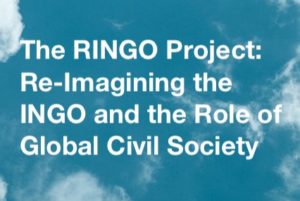The topic of valuable and equal partnership is not new. It is an essential tool to strengthen local power, proven by multiple researchers. As the National Network of Local Philanthropy Development team, we and our 15 members (Ukrainian community foundations) had an opportunity to reevaluate the need for flexibility, understanding and trust under war conditions in Ukraine. At the start of the war, we were dismayed by the lack of funding reaching local organisations, as well as the duplication of ‘assessments’ by INGOs and UN agencies. We issued an open letter calling for more and better support. Rights CoLab and the RINGO Project also wrote a piece outlining what is needed from the INGO community to demonstrate solidarity.
Below we share three stories that empowered our faith in the possibility of finding loyal partners amongst INGOs, and demonstrate the value of locally-led aid.
Create a win-win situation
For the first story, we would like to introduce you to ShelterBox, an INGO which focuses on emergency disaster relief and supplies for house reparation. Our network and the ShelterBox team started the partnership in September 2022 with a Winterization project aimed to help Ukrainians and improve their living conditions during the cold months of 2022/23. The INGO team was enthusiastic about the idea of reaching 15 community foundations via only one partnership with us.
As the cold weather was coming faster than the required timeline for a full due diligence process, we had to reason with our partners to start the project immediately. With negotiation skills from our side and some trust from their side, we achieved a positive result.
Emergency response projects are traditionally very resource intensive. In this case, to optimise our efforts, we agreed that the usual weekly reports of distributed kits would be replaced with team-to-team online meetings. On the second iteration of the project, we started to use Kobo ToolBox to have easier access to data and avoid disruption from both sides, and Talk to Loop to collect direct feedback from beneficiaries.
At the end of the day, we were able to get winning conditions for both parties. The project needed to have a local procurement component (from Ukrainian producers), so that our network members engaged in capacity-building activities, ensuring that we were able to respond quickly to emergencies. During the meetings and discussions, our team had to stand our ground on some aspects and respond to the concerns of our partner by providing compromises on others. This cooperation effectively committed to improving our procurement policy and holding a tender. We were also able to create a reserve of goods in our warehouse, in order to respond quickly in the event of a possible emergency.
High risks require even higher flexibility
Last year, one of our network members, the Kherson Community Foundation, started a partnership with ChildFund Deutschland. The project revolved around supplying emergency responses for families affected by the Russian attack on the Kakhovka Dam on the 6th of June 2023, causing extensive flooding along the lower Dnipro river.
Cooperation started with a pre-project meeting to manage expectations from both sides. The community foundation team was positively surprised when the INGO agreed to design emergency kits based on their local needs assessment and cover all overhead costs applied to the budget.
The whole territory of Kherson is covered by constant shelling and sometimes local teams deliver help kits to villages located less than 2 kilometres from the Russian troops’ location. In high-risk circumstances, the needs could change daily, and the Kherson community foundation maintains constant communication with the INGO team to agree flexibility within the budget.
Find your partners by values
Our third story started at the Philea Forum 2022, where our team met representatives from Fondation de France. At that time, we briefly discussed the idea of a project to help medical institutions in Ukraine through a regranting component for local organisations, and local procurement to cover their medical needs. After a standard application for funding from our side, Fondation de France supported the start of the MedAid project.
Fondation de France’s philanthropic values are aligned with ours. We have a common view on project implementation and there was no need for negotiations or compromise on either side. The Fondation de France team made everything as quick and easy as possible for us: calls only when necessary, simple interim and final reporting, and no bureaucracy. Besides the MedAid project, they supported our initiative for developing youth leadership and helped greatly when the earlier explosion on the Kakhovka Dam happened.
In addition, we appreciated the opportunity to discuss the differences between Ukrainian and French philanthropy development when the Fondation de France team came to Ukraine for a visit.
Conclusion
As local and national organisations, we have to take our share of responsibility to ensure equality in partnerships: from showing zero tolerance for violation of our values and rights, to searching and actively suggesting better solutions in our existing partnerships.
Here are a few of our lessons that we learned about building more effective and equitable partnerships:
- First and foremost, the partnership is about people – and only then about companies, organisations, or businesses. Always try to see the people who stand behind decisions and talk to them directly.
- In an equal partnership, the two parties must be equally interested in cooperation. As such, they will be able to find a balance between standing their ground and listening to each other.
- Filter your future partners by common values. The better your missions align, the greater chance you have to build long-term relationships.
- It is important and necessary to agree on the terms of the partnership beforehand. Nevertheless, leave some space for emergencies and let INGOs be aware that you expect certain flexibility. Alert your partner to make common participatory decisions.
- Ensure that you have an efficient communication channel and don’t be afraid to provide feedback to your partner.
